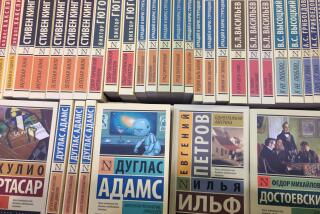Bridging the Culture Gap : Soviet Debating Team Swaps Views With UCLA Students
- Share via
Members of a Soviet debating team on a tour of American universities say they have encountered no hostility, only hospitality and friendship, in their host country. But some of the questions have been surprising.
“One student asked me if I was afraid to visit the United States,” said a wide-eyed Yelena Kravchenko, 25, who along with two Soviet teammates visited UCLA on Tuesday to debate a team of American students.
“The question was a shock to me,” said Kravchenko, who added that as a graduate student and member of the faculty at Moscow State University she has had extensive contact with visiting American students and professors at the Soviet university. “Why should I be afraid? We’re all human beings and share this earth.”
Kravchenko blamed the “strange” questions she has encountered on “a very big lack of information about our country” in the United States. She and her teammates said they hoped that their two-week tour of seven college campuses might help dispel some of the myths.
Soviet and American debating teams have toured each others’ countries every two years since 1972, under a program sponsored by the U.S. Speech Communication Assn.
Michael Hazen, the team’s American escort and a representative of the association, said it is the only exchange program between the two countries that allows students to talk to each other and exchange views before large audiences. He said that the program has continued despite cutbacks in other U.S.-Soviet exchange programs in recent years.
The Soviet team faced stiff opposition at UCLA, which for the past four years has won the national championship of the Cross-Examination Debate Assn., the largest college debate rating organization in the country. In the Soviet Union, there is no formal debating tradition or debating competition, Hazen said. The Soviet team was chosen from among applicants by the Student Council of the U.S.S.R.
Members of both the American and Soviet teams emphasized their common goal in presenting an open exchange of ideas and their shared view that their two countries should work together to improve world conditions.
But, once on stage, before an audience of about 500 students, the two teams began defending their own country’s policies.
Objected to Premise
The topic was “What are the responsibilities of the U.S.S.R. and the U.S. for assisting the economy, political stability, and growth of developing countries?”
Soviet debater Vladimir Mescheryakov took exception to the premise posed by one of the American debaters that both super powers have “a duty . . . to enhance the stability of Third World countries.”
Mescheryakov said the Soviet Union considers it “our moral obligation,” but not necessarily a duty.
“The Soviet Union had no colonial possessions. The Soviet Union did not import black slaves . . . still we recognize our obligation,” said Mescheryakov, who proceeded to list contributions by the Soviet Union to development in Third World countries.
Outside the debating hall, however, Kravchenko emphasized that despite the differences of opinion expressed in the debates, the two countries “have some common goals and we must find a common language in order to solve the main global problems of the day.”
Noting that this is her first visit to the United States, Kravchenko said that despite years of studying about America, she has found it “very interesting to look at life in this country with my own eyes.
“I see that Americans are also human beings, also have children, song and flowers. I see that they also want to live in peace and help improve the situation in the world.”
More to Read
Sign up for Essential California
The most important California stories and recommendations in your inbox every morning.
You may occasionally receive promotional content from the Los Angeles Times.













